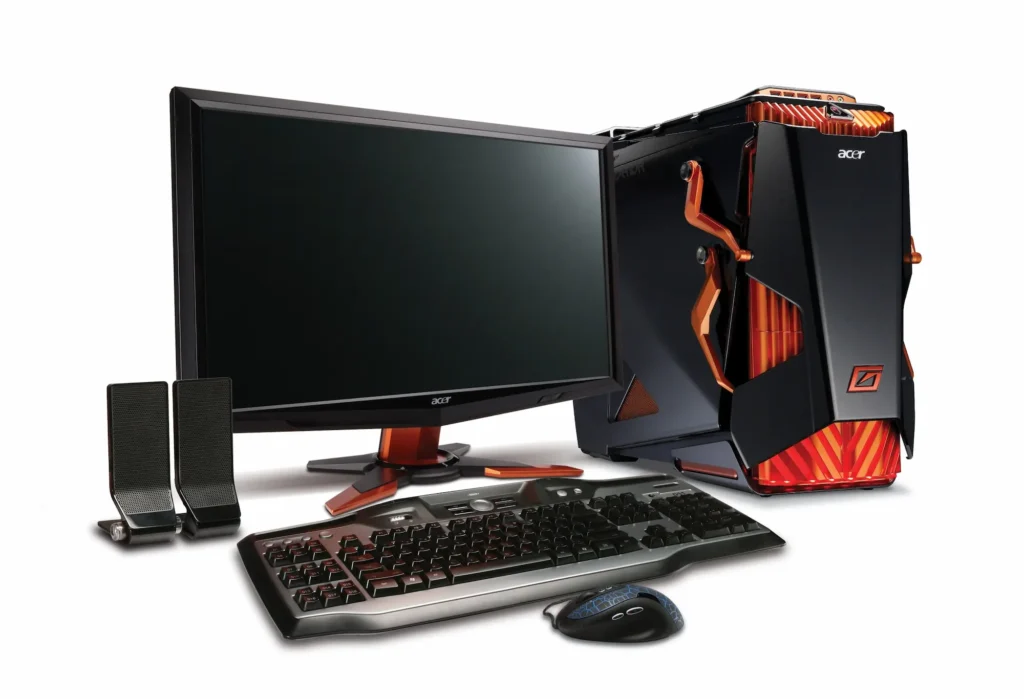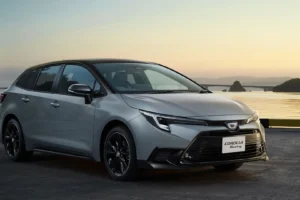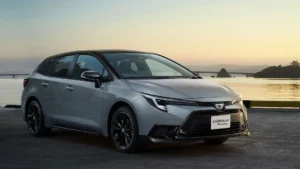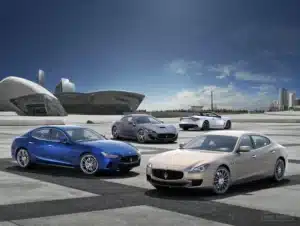Table of Contents
The first step is to research and understand the essential computer components, how they impact performance, and exactly what you should look for. In 2025, choosing a desktop computer can feel overwhelming due to the wide variety of brands, technical specifications, and continuous advancements in technology. But don’t worry—this comprehensive guide will clearly explain these key components, making the process of choosing a desktop computer straightforward and stress-free.
Determining the Purpose of Your Desktop Computer
Before even looking at specific brands or pricing, understanding your desktop’s intended use is crucial. Each scenario, whether it’s office work, gaming, graphic design, video editing, or casual browsing- demands different technical specifications. Clearly identifying these needs first will ensure you won’t spend unnecessary money on overly powerful hardware or, worse, select inadequate components.
For Office Work
- Processor (CPU):
Opt for mid-range yet reliable CPUs like the Intel Core i5-13400 or AMD Ryzen 5 7600. These processors provide efficient multitasking capabilities without overspending.
- Memory (RAM):
Ensure your desktop includes at least 8GB of DDR5 RAM. This is sufficient for smoothly running multiple office applications simultaneously without slowing down or causing performance bottlenecks.
- Graphics Card:
For general office work, a powerful dedicated graphics card is usually unnecessary. Integrated graphics provided by modern processors will comfortably handle everyday tasks, web browsing, and multimedia playback.
- Storage:
Selecting an SSD (Solid State Drive) with at least 512GB capacity is highly recommended. SSDs significantly enhance speed and reliability, enabling faster boot times and quicker access to your files and applications.
- Display:
A clear, high-resolution display (at least 1080p) is essential to reduce eye strain, especially if you spend long hours working at your desk. Additionally, consider monitors with built-in eye-protection technologies like flicker-free screens and blue-light filters.
For Gaming
- Processor (CPU):
A robust CPU is essential for seamless gaming performance. Ideal choices include Intel Core i7-14700K or AMD Ryzen 7 8700X. These processors offer high clock speeds and efficient multitasking, crucial for modern, intensive games.
- Graphics Card (GPU):
Choosing a high-performance dedicated graphics card is mandatory for gaming. Consider modern GPUs such as the NVIDIA RTX 4060, RTX 4070, or AMD Radeon RX 7700 XT. These graphics cards handle graphically intense games, delivering excellent frame rates and realistic visuals, including ray tracing capabilities.
- Memory (RAM):
Gaming desktops in 2025 require at least 16GB of DDR5 RAM for smooth performance. More memory allows quick and efficient data handling, eliminating frustrating lag during gameplay.
- Storage:
Opt for at least a 1TB NVMe SSD for storing and quickly accessing games and applications. Modern games are becoming increasingly large, and an SSD ensures rapid loading times, enhancing your gaming experience significantly.
- Cooling and Case:
Powerful components generate substantial heat. Thus, ensure your gaming desktop comes with efficient cooling solutions (such as liquid cooling or high-quality air cooling) to maintain optimal performance and longevity of components.
- Display and Peripherals:
Invest in a gaming monitor with a high refresh rate (144Hz or higher) and minimal latency, significantly improving your gameplay experience. Also, choose responsive peripherals (gaming mouse, keyboard) for maximum accuracy and comfort during long gaming sessions.

Budget Considerations
Are you confused about choosing a desktop computer due to the wide range of prices? Don’t worry, budget is a key factor, but it’s not an obstacle if you know how to invest wisely. In this section, we’ll help you understand how to balance price and quality to get the best value for your money.
Low-Cost Desktop Computers
These desktops are perfect for users who primarily use their computer for basic tasks like web browsing, email, and simple office applications.
- Processors: Typically equipped with entry-level processors such as Intel Core i3 or AMD Ryzen 3.
- RAM: Usually includes 4GB to 8GB RAM, which is sufficient for basic multitasking.
- Storage: Often come with HDD storage, though SSDs are becoming more common even at lower price points.
- Examples: Basic Dell Inspiron series or HP Slim Desktop series.
Mid-Range Desktop Computers
Mid-range desktops are ideal for office use, moderate multitasking, and casual gaming.
- Processors: Often feature Intel Core i5 or AMD Ryzen 5 processors, providing solid performance without a significant price jump.
- RAM: Usually offer between 8GB to 16GB of RAM, allowing smoother multitasking and better performance with demanding applications.
- Storage: Frequently feature SSD storage ranging from 512GB to 1TB for faster booting and data transfer.
- Examples: Lenovo ThinkCentre, Dell XPS, or HP Pavilion Desktop.
High-End Desktop Computers
These desktops are intended for intensive tasks such as professional graphic design, gaming, and video editing, where performance matters most.
- Processors: Powered by high-end CPUs like Intel Core i7/i9 or AMD Ryzen 7/9.
- RAM: Typically include 16GB to 32GB of RAM, which helps manage demanding software and heavy multitasking.
- Graphics Card (GPU): Equipped with advanced dedicated graphics cards, such as NVIDIA RTX 4070 or AMD Radeon RX 7900 series, essential for high-quality visuals and smooth performance.
- Storage: Usually equipped with high-capacity SSDs (1TB or more) for optimal speed and efficiency.
- Examples: ASUS ROG Strix, Alienware Aurora, or Corsair One Pro.
Processor: The Heart of the Device
When choosing a desktop computer, the processor is arguably the most crucial component as it directly influences overall performance. Understanding processors ensures that your computer meets your specific demands.
Common Processor Types
- Intel Core i3 / AMD Ryzen 3: Ideal for basic computing tasks like browsing, email, and document editing.
- Intel Core i5 / AMD Ryzen 5: Provides balanced performance suitable for moderate multitasking, general office work, and casual gaming.
- Intel Core i7/i9 / AMD Ryzen 7/9: Designed for demanding tasks such as gaming, high-resolution video editing, and professional design.
RAM: Ensuring Speed and Performance
RAM significantly influences your desktop’s ability to handle multitasking and demanding software, making it essential when choosing a desktop computer.
How Much RAM Do You Need?
- 4GB: Suitable only for basic computing tasks.
- 8GB: Recommended for everyday users; sufficient for standard multitasking and moderate application usage.
- 16GB or More: Essential for gaming, graphic design, and video editing to ensure efficient performance without slowdowns.
Storage: HDD or SSD?
Your desktop’s storage affects performance, boot time, and overall efficiency. Thus, carefully selecting your storage type is vital when choosing a desktop computer.
What is HDD?
- HDD (Hard Disk Drive): Relies on rotating disks and a mechanical arm to read and write data.
- Pros: Large storage capacity at low prices (e.g., 1TB or more).
- Cons: Slower data transfer, more prone to damage due to mechanical parts.
What is SSD?
- SSD (Solid State Drive): Relies on flash memory to store data, with no moving parts.
- Pros: Extremely fast data transfer, faster system and application performance, more resistant to shocks.
- Cons: Higher prices compared to storage capacity (e.g., 512GB can be expensive).
When to Choose HDD?
- If you’re looking for large storage capacity at low prices.
- If your usage is limited to storing large files like movies and backups.
When to Choose SSD?
- If you want fast system and application performance.
- If you use applications that require quick data access, like gaming or design software.
Mixed Options (HDD + SSD)
You can choose a device with an SSD for the operating system and essential applications, and an HDD for storing large files.
This option balances speed and storage capacity.

Display: Size and Resolution
The desktop’s display impacts your comfort and overall computing experience significantly.
Display Size
- Small displays (less than 21 inches): Suitable for limited spaces, but may be uncomfortable for prolonged use.
- Medium displays (21 to 24 inches): The best option for most users, offering enough space without taking up too much room.
- Large displays (27 inches or more): Ideal for gaming, design, or multi-window work, but require more space.
Display Resolution
- Full HD (1920×1080): The standard resolution for most users, offering good clarity at reasonable prices.
- QHD (2560×1440): Offers higher clarity, suitable for gaming and design.
- 4K (3840×2160): The best option for professionals who need high resolution, but requires more resources from the device.
Display Type
- LCD: The most common option, offering good performance at reasonable prices.
- LED: More energy-efficient and offers brighter colors.
- OLED: Offers accurate colors and high contrast, but can be expensive.
In the end, choosing a desktop computer that suits your needs requires a clear understanding of your usage and budget. By following the tips mentioned in this article, you’ll be able to make an informed decision and purchase a device that meets your expectations.
Whether you’re looking for a computer for work, gaming, or everyday use, the market offers a variety of options to suit all needs. Don’t forget to compare the available options and read reviews before making your final decision.
To choose a desktop computer that operates at the highest efficiency, visit Soum now and select your next device at competitive prices with unmatched quality and efficiency.


















